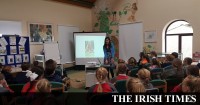
10 Tips for Writing (Both About Yourself and in General)
juneauempire.com – Sunday October 13, 2019

One of my favorite (and simultaneously most hated) qualities of children is their tendency to be unintentionally blunt.
Over the past year, my daughter, son and their little parliament of friends have called me out on hiding my baldness with a Yankees cap, wearing the same clothes every day and “having claws” (read: grossly unclipped toenails). I don’t even want to tell you the comments I hear at the pool. Suffice to say I need to cut back on the midnight Nutella spoons.
Earlier this week, the apples of my eye point-blankedly asked me why I didn’t have a job. I told them that wasn’t true, that I was a writer, to which they both responded: “no, a real job.” So I printed a copy of my curriculum vitae. I still don’t think they were impressed — even after they checked my references.

There Is No Such Thing as 'Too Similar' When Publishers All Want the Same Book
jezebel.com – Wednesday October 9, 2019

A few years ago, when I was shopping my now-shelved first novel, an industry insider told me to put the word “girls” in the title. “Girl” novels were big at the moment: Gone Girl, Girl on the Train, The Girls. But a few months later, I was told I had to change the title. There were too many novels about girls.
That is pretty much the way the publishing industry works. Once a title becomes wildly popular, rival imprints rush to get their hands on books that are slight variants on the same conceit until they have too many books on the same topic—say, a woman with a substance abuse problem who witnesses a crime—and once that topic is oversaturated, they move on to something else. In a recent Buzzfeed article, historical fiction novelist Kim Michele Richardson said that details in bestselling author of MeBeforeYou Jojo Moyes’s new novel are too close for comfort to those included in her own work. However, in an industry that frequently gets stuck on the same idea, the similarities in their work look more like byproducts of how well both women know which details are required of their genre, and the fact that many books are becoming difficult to distinguish from one another.

What Is A Book Coach? A Guide To Seeking And Becoming One
bookriot.com – Friday October 4, 2019

Are you still scratching your head trying to work out just what exactly a book coach is?
Here’s the scenario:
You’ve got a great idea for a book, you read copiously, and you’re a pretty talented writer (if you say so yourself). You’ve read On Writing by Stephen King and The Writing Life by Annie Dillard and you’re acquainted with copious theories on plot and pacing and characterisation, but you just can’t seem to get that New York Times bestselling book from your head to paper.

A penny a word - you pay
By G. Miki Hayden
Instructor at Writer's Digest University online and private writing coach
firstwriter.com – Saturday September 28, 2019

GMH: What common style mistake bugs you the most?
Phyllis Grann, the first woman CEO of a major publishing firm: The use of unnecessary words.
Writers being paid by the word say that instead of “bang,” they might write “bang, bang, bang” for gunshots. That’s really a joke—sort of. While often the length of a story or article is fixed by guidelines and a flat fee is paid, sometimes writers do get paid by the word, even today. But any writer imagining that adding unnecessary words to a piece is a good idea isn’t the writer who is going to sell the story or article. And that’s the long of way of saying that the best writing is economical writing. How many words should the story or article be? As many as telling the story takes, but not a single word more.

YA Authors You Should Be Following for Writing Advice
bookriot.com – Thursday September 26, 2019

Writing…is hard. I wanted to say something more profound about the exhausting and turbulent life of a writer and the never-ending worry of publishing and judgment, but when it comes down to it, writing is just hard. We do it anyway, though, because it’s some sort of natural instinct to use our words to say something, anything. We still write, even when we don’t want to. Even when I’ve tried to quit writing entirely, I still come back to it.
And oh, how I wish it was this beautiful, graceful moment where you sit at your perfectly messy-while-still-organized desk, take out your fountain pen, and the most profound and perfect words stream out onto the paper. No, it’s a gruesome process, fighting your way back into writing.
Luckily, we’re never in it alone. Personally, I don’t have a ton of writing friends to bounce ideas off of or get inspiration from, and I’m sure it’s the same for a lot of people. But what’s really pushed me out of a deep, dark writing slump is other writers. And thank god for the internet, because I’ve got an endless amount of writing advice to pick through!
After some deep digging, writing prompts, and podcasts, I’ve gathered some of the most helpful writing advice I’ve found, from some pretty spectacular YA authors.

How Do I Know If I’m Getting a Good Cookbook Deal?
eater.com – Tuesday September 24, 2019

It can feel like everyone in the food world is writing cookbooks these days — big-name chefs, burgeoning Instagram influencers, bartenders with cult followings. They make it look easy, but in truth, the world of cookbooks isn’t as glamorous as it seems, and it’s more important than ever for authors to understand the process and protect themselves before and while writing one.
Eater turned to lawyer Jasmine Moy to learn more about how cookbook deals come together.

How soap operas influence my saga novels by Glenda Young
femalefirst.co.uk – Tuesday September 17, 2019

I’ve been a fan of Coronation Street since before I can remember. It was the show I used to watch with my mum and grandma, all three of us huddled on the sofa. My grandma and I used to love Elsie Tanner, the wicked woman of Weatherfield, no better than she ought to be. She had a string of men in her past and I loved the naughtiness of Elsie, the cheek of her.
I went on to write TV Tie-In books about Coronation Street for ITV. I also contributed to the official ITV Corrie website, to their official magazine and to various one-off ITV publications about the soap. I have also written unofficial fan books. In addition, I set up and now edit the Coronation Street Blog, a fan site written by and for fans. It’s been online since 2007 and remains unique, a labour of love. And I’ve been writing online Corrie weekly updates since 1995. So being a fan of the show and writing about it is in my blood. It comes naturally to me. You could say I’m steeped in soap opera. I know their twists and turns, their cliff-hangers and signposts. Most of all, I know their women.

Beginners guide for writing a novel
thriveglobal.com – Saturday September 14, 2019

“Every secret of a writer’s soul, every experience of his life, every quality of his mind, is written large in his work” ~ Virginia Woolf
Becoming an author can change your life—not to mention the impact the author’s voice has on the readers. However, writing a novel is not a piece of cake. It is better to call it quits then completing a book. It happens when you run out of ideas, or your own story bores you, or you become overwhelmed by the scope of finishing what you started, compels you to quit.
For a beginner, writing can seem daunting, but if you have a passion to write your own story and know the ways to make the process easier, you can make it to the end of your novel. So without further ado, let’s discuss ten tips which can keep you motivated till the end of your project.

What it really takes to be a writer, according to Roald Dahl
stylist.co.uk – Friday September 13, 2019

Ever dreamed of becoming a great writer? We’re pretty willing to bet that almost anyone reading this page has, at some point, felt a story bubbling up inside of them… but that, for whatever reason, they decided not to sit down and put pen to paper.
Of course, it’s not exactly unusual that so many of us have been scared off. After all, writing is hard work. Indeed, looking back on his years as a writer in Boy: Tales of Childhood, Roald Dahl contended that “two hours of writing fiction leaves this particular writer absolutely drained”.
The celebrated author continued: “For those two hours he has been miles away, he has been somewhere else, in a different place with totally different people, and the effort of swimming back into normal surroundings is very great. It is almost a shock.

Events, dear boy … the reality of life as a children’s writer
irishtimes.com – Thursday September 12, 2019

When you imagine the life of a writer, you probably see us shut away in a room at a desk, scribbling or typing furiously, or staring into space hoping for inspiration. But if you write for children, you are likely to spend a good bit of your working life meeting your readers. At certain times of the year - especially now, with new books hitting the shelves for autumn and Children’s Book Festival on the horizon – writers can have a full timetable of events that leave them barely enough time to actually write.
I have two new books for children coming out this autumn – Laura’s Spooky Show has just hit the shelves, and Reindeer Down, a Christmas story for younger readers, will be published by the O’Brien Press in October. It’s exciting to be embarking on a new round of visits to schools, libraries and bookshops. Exciting, and terrifying.
Get the free newsletter | Submit a news item or article | Get Writers' News for your website





